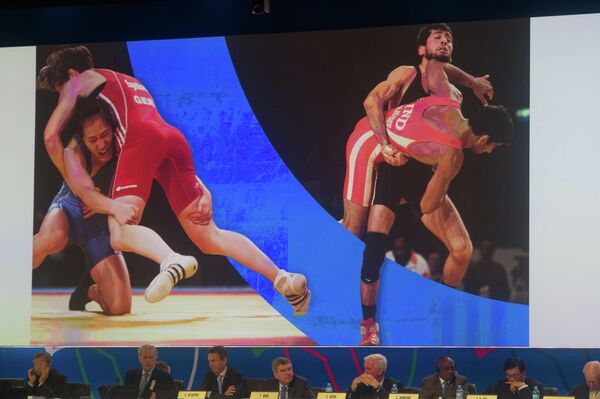ST. PETERSBURG, September 9 (R-Sport) – There was widespread relief in the Russian sports community Monday as the country woke up to find wrestling, one of its traditional strengths, returned to the Olympic program.
In February, the International Olympic Committee (IOC) removed wrestling from the program from 2020 onwards, but the ancient Olympic discipline was reinstated Sunday, defeating two other candidate sports. Of 90 IOC members in Buenos Aires, 49 plumped for wrestling, 24 for a joint baseball and softball bid and 22 for squash.
That was a victory for the multinational coalition of supporters who teamed up to back wrestling - enemies on the mat and often in diplomatic terms, too. The US and Iran were both prominent, as were Japan and Russia, which topped the medal table in wrestling at London 2012 with four gold medals and 11 in total.
“From the first day, when they said wrestling could be excluded from the Olympics, I didn’t believe it – it’s one of the fundamental Olympic sports,” five-time world champion Gogi Koguashvili, who now coaches the Russian national team, told R-Sport.
“But yesterday before the vote, I felt uneasy all the same. It’s good that these experiments on wrestling have finished and that the truth has prevailed.”
Russian officials were strong supporters of wrestling’s reinstatement, and President Vladimir Putin threw his weight behind the cause. Russia’s government sets great store by the country’s total Olympics medal count, even in less glamorous events such as wrestling, which had been under threat largely because of its declining popularity among the young and claims of match-fixing.
One important factor in wrestling’s return, according to Russian Sports Minister Vitaly Mutko, was the success Saturday of Tokyo’s bid to host the 2020 Olympics. Japan, which won six medals in wrestling in London, was one of the sport’s strongest backers, certainly more so than its closest rival for 2020, Spain.
“Of course it’s very hard to find a direct connection, but Tokyo is a city that’s developing wrestling itself, and they have a special relationship with wrestling,” Mutko told R-Sport. “The extra support certainly wasn’t a hindrance.”
The wrestling that rejoins the Olympics will have several important differences from the sport that was removed from the program in February. That setback prompted a rethink among wrestling officials, who have changed the rules to favor more spectacular – and thus more telegenic – throws, as well as giving women two more medal events. Some have called for further tweaks.
“We need to capitalize on the opportunity which we have received and continue to move the sport forward. Momentum is on our side,” USA Wrestling’s executive director Rich Bender said in a website statement. “We must continue to be passionate and aggressive in promoting and improving wrestling in the United States and around the world.”
There was also political change, as International Federation of Associated Wrestling Styles president Raphael Martinetti was ousted after the sport was cut from the Olympics and replaced by Nenad Lalovic, who assiduously courted IOC dignitaries.
One thing unlikely to change, however, is the sport’s balance of power. Russia’s wrestlers crushed the opposition to top the medal table at April’s European championships and July’s University Games.
The next target for the country’s Olympic medal hopefuls is next month, when the world championships will take place in Budapest.

